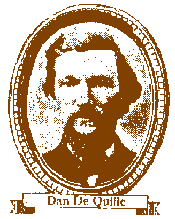Organization Begins The State of Society excerpted from The Big Bonanza by Dan DeQuille of the Territorial Enterprise |  |
Organization Begins The State of Society excerpted from The Big Bonanza by Dan DeQuille of the Territorial Enterprise |  |

Owing to he break-out of the war with the Piutes and to the fact that the precious metals existed in solid quartz, and in most instances far beneath the surface, where it could be reached by means of deep shafts or long and expensive tunnels, many men who came to the country early in the spring of 1860 left in disgust.
Hundreds of prospectors came in the expectation of being able to find rich placer mines, or at least large deposits of decomposed quartz, rich in gold, which they might wash out with rockers and sluiced, as they were accustomed to wash the auriferous gravel of the California gold-fields. Being unable to find anything of this kind, except the ground already taken up and worked at Virginia and Gold Hill, these men said that, though rich, the mines were of "no extent," and made haste to return to those they had left on the western slope of the Sierras, in the Golden State.
The business of working silver-mines was then new to our people, and ar first they depended much on what was told them by the Mexican silver-miners who flocked to the country. Mexicans were in great demand. The man who had word of a Mexican that his lead or his location was "bueno," felt that his fortune was made. It has since been suspected that many of these Mexicans were but "vaqueros" from the cow counties" of California, who knew no more of silver and silver-mining than a Digger Indian. They were shrewed enough,however, to keep their own counsel, and any man who spoke the Spanish language was supposed to have mined all his days in the richest silver-mines of Mexico.
There were, however, undoubtedly in the country many old and skill Mexican miners- skillful after the fashion of mining in Mexico-and with what our people were able to learn of these men, and what they soon themselves discovered, it was not long before very good work was being done, both in the mines and in the works erected for the reduction of the ores. In the reduction of ores much that was of great practical value was learned from the scientific Germans who flocked to the mines, men who had had much experience in the silver-mines of their own country, both in mining and in the working of ores. Allthough rapid progress was made in mining and milling, in building roads and making substantial improvement of all kinds, Washoe was a region almost destitute of laws of any kind, and all carried pistols and knives at their belts, each man a "law unto himself."
The people of Western Utah, now Nevada, were supposed to be living under Mormon law, but the laws of the Saints were distasteful to the Gentiles and they would have nothing to do with them. They preferred living under some such " rules and regulations" as we have seen were adopted at Gold Hill in June 1859, or to settle their difficulties in a fair fight. Such a dislike had the people to the Mormon laws that they early began to agitate the matter of a separation from Utah and the erection of a new territory out of its western half. Delegates were sent to Congress to urge this, but nothing was accomplished, and at length the people took the matter into their own hands and determined to seccede from Utah.
A convention was called, and met at Genoa, July 18, 1859, when steps were taken for the formation of a "Provisional Government." " A Declaration " and "Constitution" were drafted, submitted to a vote of the people, and adopted. An election for governor and members of the legislature was held, and, December 15, 1859, this Legislature met at Genoa, the capitol, organized, received the "first annual message" of Governor Roop, passed a number of resolutions, appointed a few committees, and then adjourned. This was their first and last adjournment; they never met again. The silver-mines were discovered and Governor Roop and all hands had other things to think of. The new population created by the grand rush to the new mines so altered the whole face of affairs that it was considered inexpedient and impolitic to proceed further in the provisional government at that time. The discovery of silver and the rapid settlement of the country soon brought the people of Western Utah to the notice of Congress: The Territory of Nevada was created, and in July 1861 Governor Nye and a number of the Federal appointees arrived in the country and set in motion the wheels of a government that was in accord with the feelings and traditions of the people. In 1869, however, the Mormon laws were the only laws left to the people, the Legislature of the provisional government having adjourned before making any new laws. Having an abundance of rules and regulations, with that ready-reckoner the revolver, laws were not much missed for a time; besides, all were too eagerly engaged in the pursuit of wealth in the shape of mines of silver and gold to give much serious attention to matters political.

Bridget E. Smith, editor & publisher
Email | Home Page | Dan DeQuille's Title Page
Historical Gazette
Published in Portland, Oregon
© 1991-